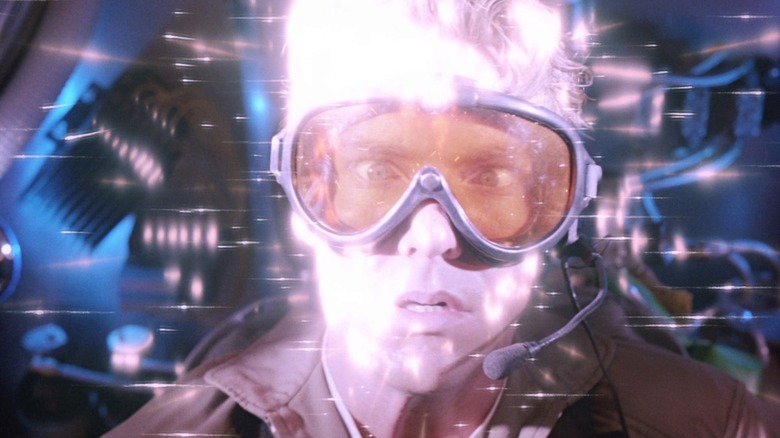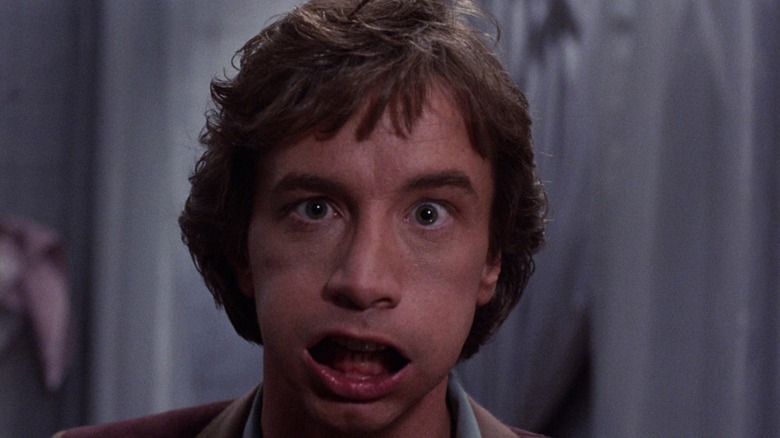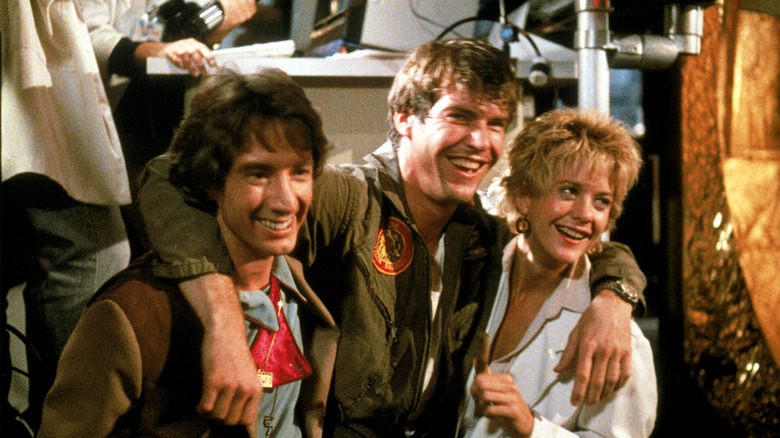Joe Dante Has A Theory On Why Innerspace Ended Up As A Box Office Flop
Try and find anyone who doesn't like Joe Dante's science fiction comedy "Innerspace." Whether you're a child of the '80s, you discovered the tiny adventures of Dennis Quaid and Martin Short on DVD and home video, or happened to catch it at a special theatrical screening, chances are you love this movie. The inventive story follows marine Lt. Tuck Pendleton (Quaid), an experimental test pilot who is accidentally injected into a civilian named Jack Putter (Short) after being scientifically miniaturized. Unfortunately, you probably did not see "Innerspace" when it first came out in theaters in July of 1987. That's a primetime summer blockbuster slot and the powers that be genuinely thought the combination of Dante's direction and state-of-the-art effects was going to result in a smash hit for Warner Brothers. Unfortunately, no one showed up to see it when it was originally released.
At its Something Old, Something New Festival at the New Beverly Cinema in 2012, UCLA's Association of Movie Archivists (AMIA) student chapter showed a double feature with "The Incredible Shrinking Man" and "Innerspace" with director Joe Dante in attendance. Dante shared his experience making the film, saying that "Innerspace" got "one of the best previews" ever in test screenings which caused the studio executives to start "high-fiving each other" thinking they had a massive hit on their hands. In fact, they were so convinced that "they didn't think it needed any advertising as a result."
That's not a very good marketing strategy. In theory, wouldn't you have an even bigger summer hit if, you know, moviegoers actually knew the movie existed? The director of "Gremlins" should have gotten more respect!
We need to talk about Martin Short
There's a painful truth that needs to be addressed: Hollywood has never known what to do with Martin Short. The Canadian comedian first gained acclaim in the Great White North with his breakout performances on "SCTV," Canada's answer to "Saturday Night Live." In a stroke of luck, he wound up opposite Steve Martin and Chevy Chase in "¡Three Amigos!," a beloved comedy now that severely underperformed at the box office on release, just like his next film, "Innerspace."
The character of Jack Putter was actually a perfect fit for Short, and the chemistry he had with Quaid was undeniable, even if they only appeared onscreen together at the very end. Screenwriter Jeffrey Boam ("Indiana Jones and the Last Crusade") came aboard and Dante (via Ultimate Rabbit's report) described his rewrite as "Dean Martin being shrunk and then put into Jerry Lewis." That's a perfect description and the physical comedy that Short pulls off in "Innerspace" feels like he's channeling Jerry Lewis at times. Quaid balances that manic energy with a calm and collected performance that also showcases his explosive side when things get tense as he navigates his way through Short's body.
Dante recalled one lunch meeting in particular where Warner Bros. executives referred to Short as "not very attractive" and that maybe he should be recast...with a Dennis Quaid type. Dante snapped back, asking "Did you even read the script?" That lack of studio support may have caused some insecurity with Short, who Dante said "liked doing many takes" and "did a lot of improvisation" throughout the entire production.
According to Dante, Short even got on his knees once and did an impression of Katherine Hepburn pleading, "No Joe! Please let me do just one more!"
Audiences rejected the film's sci-fi B-movie roots
When the New Beverly showed "Innerspace" at the Something Old, Something New Festival and coupled the film with "The Incredible Shrinking Man," they knew exactly what they were doing. Dante's adventurous mini-epic took inspiration from the inventive films of the 1950s like "Fantastic Voyage" which pushed the imagination of filmmakers and audiences forward, introducing new possibilities to what a night at the movies could be.
Dante and the entire "Innerspace" cast and crew brought that sense of adventure and spectacle to a new era. Audiences would have been ready for it, too. Instead, the movie ended up underperforming at the box office in the summer of 1987. Dan Aykroyd's "Dragnet," another '50s throwback, won the top spot that weekend, weirdly. Dante told the audience at New Beverly back in August of 2012 how Warner Bros. just did not know how to promote the film. In fact, the original poster failed to include any of the actors at all. Maybe they assumed the "Steven Spielberg presents" before the title was all the film needed to succeed. "Innerspace" was an Amblin Entertainment production, after all.
Dante recalled that the L.A. Times review of the film said that it "crashed and burned" at the theater. It did come in third place, however, and in future promotions on home video, Dennis Quaid, Martin Short, and Meg Ryan (who went on to marry Quaid) were prominently featured on the box cover.
Oscar gold and Roger Ebert's seal of approval
The high-concept ideas featured in the 1950s B-movies of old were largely conceived based on advancements in visual effects. Being able to project an actor onto any background revolutionized sci-fi storytelling. Whether it was used to convey a feeling of vastness and grandeur in "Fantastic Voyage" or to depict the horrors of suddenly becoming microscopic in "The Incredible Shrinking Man," the effects drove the drama for the first time. When Scott Carey (Grant Williams) fights off a massive spider with a giant pencil in "Shrinking Man," audiences had never seen anything like it.
Dante tapped into that kind of enhanced fantasy and wonderment that carried over into Joe Johnston's "Honey I Shrunk the Kids" and modern Marvel films like "Ant-Man." In what must have been a triumphant end to the trials and tribulations of working on "Innerspace," the film went on to win the Oscar for Best Visual Effects. Even Roger Ebert was tricked by the incredible images onscreen and thought the red blood cells featured in the finished film were actually real. According to the breakdown of the New Beverly event, Dante said that he had the distinct pleasure of telling one of the nation's top movie critics that it was all just a bit of technical wizardry.
It's comforting to know that "Innerspace" has garnered a larger cult following and Joe Dante has continued to champion the film over the years. Dante, himself, has become a much more respected filmmaker and is now being recognized as the true visionary he is. In all likelihood, the film also introduced a new generation of kids to the legendary soul singer Sam Cooke. His songs "Cupid" and "Twistin' the Night Away" propel the movie into the stratosphere.



